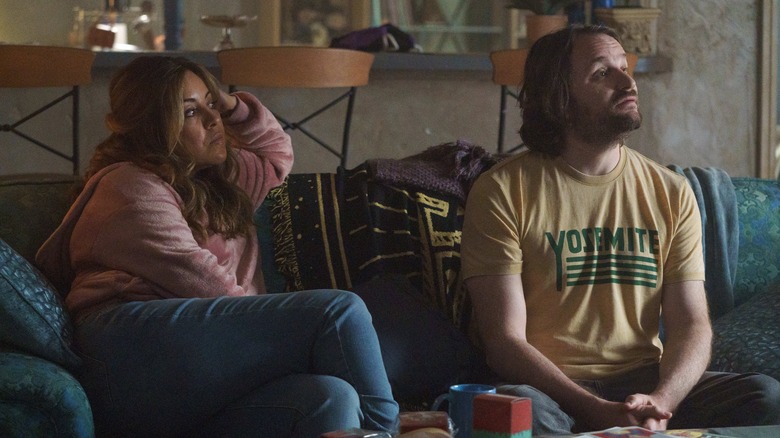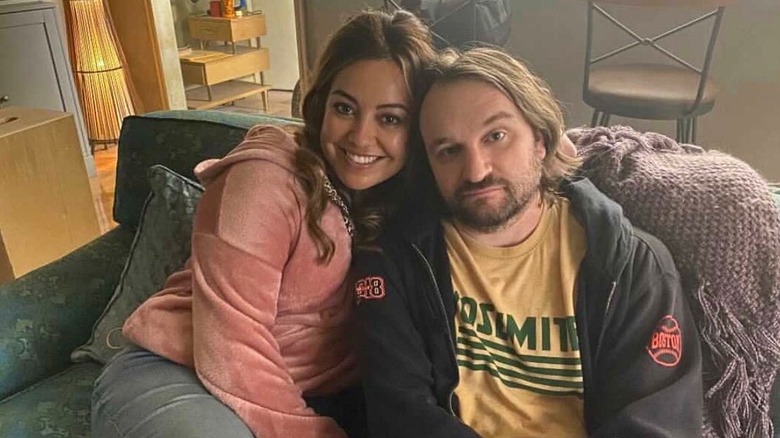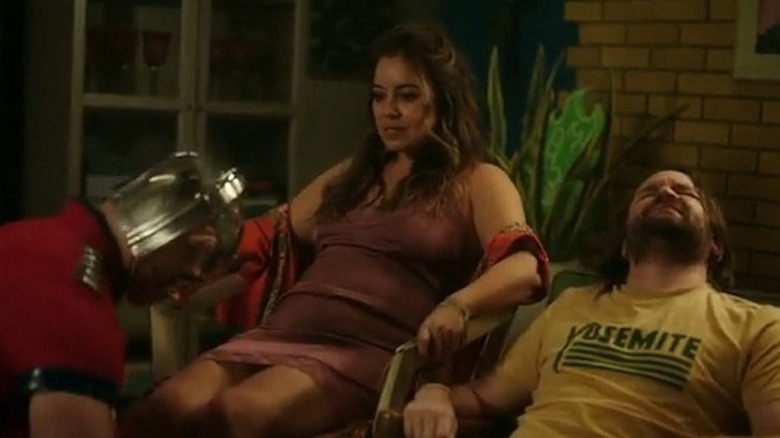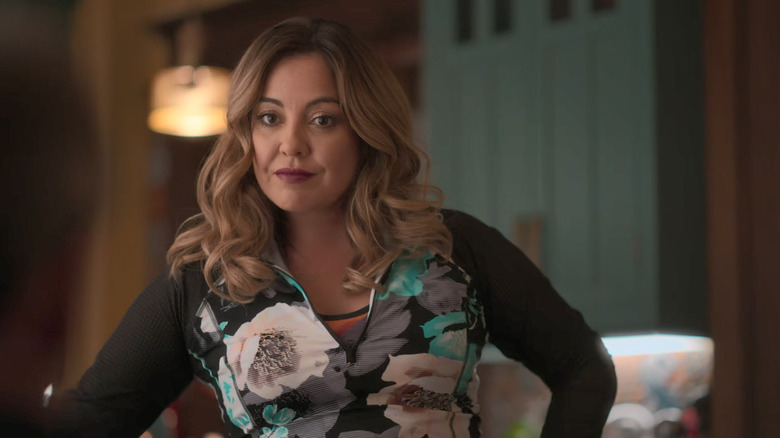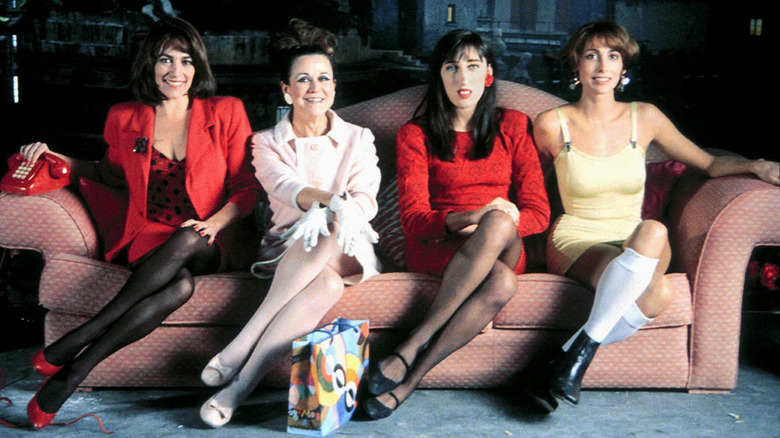Peacemaker Actress Alison Araya On Life As A Character Actor And Pedro Almodovar [Interview]
Among the subplots and side characters, there is a very dark romantic comedy playing out in "Peacemaker." It's the story of Amber and Evan, a couple without a whole lot of pleasantries to say about one another. Peacemaker crashes into their apartment, hits it off with Amber over music, and then one thing later leads to another. Per usual with writer-directorJames Gunn's work, almost everyone scores laughs in a story with no small parts.
For character actress Alison Araya, the experience and the role was one of her most fulfilling gigs in her already stacked resume. If there's a TV show on the air or streaming somewhere, there's a good chance she might be in it. Born in Australia but now based in Canada, Araya has acted in "Julie and the Phantoms," "Maid," "Lost in Space," "Riverdale," "Arrow," and most recently, "Peacemaker" and Netflix's "Brazen." During an interview, the actress told us about her journey as a character actor, her time on "Peacemaker," and her dream of collaborating with the great Pedro Almodóvar.
"The voice of God directing me from the beyond."
I've heard the pace for shooting "Peacemaker" was fast, but given your history on TV, are you just naturally accustomed to it?
Yeah. I think the fastest pace, really, are the made-for-television movies. Some of those are turned around in 21 days. It's insane. The fast pace of television can be a challenge, but it just means that from my end, I know my job and I come prepared. I mean, no one wants to spend 18 hours on set, when you have everyone working together, and of course, stuff is going to happen, there are always going to be delays. But when everyone is putting in their best effort and you're showing up and doing the work, that pace is a great rhythm and you rise to it. It's harder when you're doing the night shoots, obviously.
When you do a made-for-TV movie, how many takes do you usually get?
Not a lot. There isn't time. There's no warm-up, there's no finding your way into the scene. You're there and you got to deliver. As a character actor, you're often put in situations where you are running out of light, you're running out of time. And so, you just have to be prepared and ready to give that first take. And that's part of the experience and having that professionalism and experience that you acquired when you accumulated 80-plus credits.
Working with James, was there a lot of room for more takes and experimenting?
Oh yeah. Working with James was always a next level experience. He knows his vision, his mind. I just watched this sixth episode and thought, "Man, to get inside his mind and see how all these worlds come to be." He knows exactly what he's after. I can speak for the scenes that we shot. There were multiple cameras on us, multiple angles. It's not like we had to do a bunch of different takes because there was so much coverage, but we did have a lot of room to play.
We were given a bunch of takes to get it into it. We got enough time to rehearse it and block it and find it. And then, he gave us takes to find it, play, go bigger and then to do a little something. And he has this megaphone, he's talked about, that he communicates with us, which is rad. I had never experienced that. I remember my first day on set and hearing this booming voice, like the voice of God directing me from beyond.
Between takes, what does a piece of direction sound like from him?
"I like that. Do that again, say this, go back." He will throw out some ideas. He'll hear you improv or do something. And then, he'll throw that back and then there'll be this play and banter, and then a little bit more of that. And then, something specific that helped bring the scene together and gave me some more clarity and direction. I hope I get a chance to work with him again. I'd jump at the chance to do that again.
"Everyone was sort of figuring out the tone and the show and what was happening."
Since we first see you in the early episodes, that's usually when a show is first finding its footing, right? How was it?
Everyone was sort of figuring out the tone and the show and what was happening and exactly sort of the flavor that was happening in James's mind. All that was clear for him, but when you come together as the ensemble and all the elements are actually in play, you're finding it, you're still finding what works. At that time, for me, there's no reference point. "The Suicide Squad" hadn't come out. So, I'm trying to figure out what this world is, but the first table read that we came together for and I heard it all out loud, I'm like, "Oh, this is so fricking good."
How is it collaborating with someone like James behind the camera, on a show he's written, compared to a work-for-hire director on a TV show?
I guess the difference being when you are working on a television show that maybe has a couple of seasons under its belt, you're getting a new director every episode. So it's changing. There is consistency there, but if you're a recurring character, that director might not necessarily know the arc of your character. And so, there are different nuances, but because this world is a world that it was all James that he created, everything was very specific and he sees it all. He has that eagle eye and sees the whole big picture.
How big does he let actors go on set?
We went all out. There was nothing else left. Lenny and I both, I think I can speak for him, we just gave it everything, because there was space. It's the magic that happens when you have a great, generous scene partner like John and Lenny, and you have a director like James giving you space to explore and play and contribute. That is an experience that doesn't happen every day. And honestly, as an actor, it was such a gift when I identified that opportunity existed. My philosophy's give, give, give until they say, "Okay, enough." And so, we just kept giving and giving and giving, and it's like, "Okay, more, more, more!"
Do you think Amber and Evan will make it?
I think they do. I think they do. I think that they're that couple that sticks it out. No one knows how or why, but 20 years time on the track, they're still together.
When you read Amber's breakdown of the "Pumped Up Kicks," how'd you want to help land that joke?
There is such a science to comedy, and it's preparation and then allowing yourself to just let all of that go when you're on set and not overthink it. I think by that stage, we had run that scene a couple of times. You just lean into it and let it happen. The writing was so good that the math was all worked out. You just got to show up and speak these words with conviction. The comedy was all there.
Did you and James get a chance to talk much about music?
Not too much in person, but one of the things that I really appreciated was with every script, we would get a playlist. It was a neat accompaniment to the script. All the tracks that were in the show were there for us to read and review, and it helped feel the vibe of it.
What was your first impression of Amber on the page and how to play her?
It was the dynamic of the relationship, just that couple that hasn't looked at themselves enough. They are happy to blame the other for their own unhappiness and boredom. And so, that was the end. I was just like, this woman is so bored in this relationship, so fricking bored that anything that would come through that door is going to be far more entertaining and spark some life than this boring relationship that she's too bored to even leave.
"It was hard for me to start a career in Australia."
Why'd you make the move to Canada? Just more opportunities?
Yeah. It was mostly the fact that I met an actor in a class and I was on my way to LA, but being Australian, I didn't know anyone in LA, and so his advice was being in Canada, I could live in and work here. There weren't many Latinas in Vancouver, so that would be an asset for me. And so, I decided to come here. I didn't really know anything about the industry here. I just sort of went, that sounds like a good idea. I'm going to do that.
How was it when you first got there?
I found a lot of similarities to living in Sydney, so it wasn't too much of a culture shock. It wasn't like when I went to live in Italy, which was something completely different, but I was really determined to hit the ground running. So as soon as I got here, I was down to work and found an agent.
Within a month, I was already signed and I had started auditioning. So it took some time, it took some time to get my bearings and starting out completely new here, no one knew me. But it's paid off. I've been here, I've had a great career so far and it seems to only be getting better.
Was "Mission: Impossible II" your first acting job in Australia?
It wasn't the first job, but it was among the first jobs and definitely the first big set that I'd ever been on. It was really cool because that was a big production, a big scene that I was a part of. And so, that allowed me to work alongside Tom Cruise for a hot second and John Woo directing. I had a front row seat to witnessing some super creative genius at play, and it was a spectacular sequence, the scene that I was in. The scene was in the Spanish villa where Tom's character meets Thandie Newton for the first time, the flamenco dancers. It was cool.
Were there just not a lot of acting opportunities in Australia?
It was hard for me to start a career in Australia. I mean, we are talking like 15, 16 years ago, there wasn't a conscious effort to have diversity on screen. And that was something that I had identified as a challenge being a Latina in the Australian industry at the time. I haven't been there for a very long time, so I'm hoping that dynamic has shifted somewhat. It has on a larger global scale.
But it was hard as a BIPOC actress in Australia to get the opportunities. That's really what initially had set me off on my path to study abroad. And then when I met this actor and he pointed out that being one of few Latina actresses in Vancouver could be an asset, I listened to that. At the time, it was an opportunity, something that worked in my favor finally.
So when did you decide or know you were a character actress?
It dawned on me in a makeup chair. I was talking to one of the makeup artists. We were talking about, have you been busy? The usual conversation. I just described a couple of projects that had been bouncing around at the time. And she went, "Well, yeah. I mean, that's great because you're a character actress," and I'd never thought of myself in that way. I thought, "Oh my God, that's exactly what I am. I'm a character actress. That's why I have this freedom to jump from genre to genre to genre and not get pigeonholed." So as soon as I was gifted that optic, I claimed ownership over it and I haven't looked back. I just leaned right into it. It's been so rewarding.
"That was the film that got me obsessed with him."
You've gotten to play a good amount of doctors, lawyers or cops. Of course, no such thing as small parts, but say when the screen time is limited, how much research still goes into that when you are playing a doctor or cop?
Oh yeah. I always do my work. And that thing that there are no small parts, I think those roles sometimes can be more challenging because they're functionary roles, they're there for a specific reason. They're there to move the story forward or to provide obstacles for the leads. And so, when you are able to identify and understand exactly the function of the character in that context, then you really can deliver something meaningful to the story and not just be a person who says this piece of information to move the story forward, but to actually contribute something and make that moment your own.
I think that's what's so great about character actors. There are so many examples and so many scenes where the part might not be big, but there's something just so memorable and so specific about the offering that those actors stay with you.
Character actors do a lot of the heavy-lifting, like you say. Is exposition the toughest dialogue to deliver?
Sometimes. And technically, it can be difficult. Because, again, it's functionary to story dialogue, but the challenge and the fun is to find a way to be able to deliver this in a way that feels real and isn't just exposition, but life and information.
Clearly, "Peacemaker" was a very creatively fulfilling job. For you, what other roles have been really fulfilling?
So many. I really enjoyed working on "Maid." I thought that was another opportunity to create a character that sort of lifted off of the page. It's just those opportunities where you decide to take ownership of the character and come in with ideas and specific offerings around costume or hair or wardrobe notes or whatever, that can help elevate and create a more realized human being.
That's where I'm at in my career. And I think it's taken me some time to get that ownership, and I'm really excited about opportunities to come and to continue to sort of lean into owning my ideas and owning my craft.
What else do you hope to accomplish, especially this year?
So much. I want to continue riding this wave. I've been gifted amazing opportunities and great challenges. I think it's a promising year in terms of the opportunities that exist out there with so many streaming platforms and a renaissance of storytelling in television, whether it's in the drama, thriller, historical, fiction, comedy, whatever it is, there are some brilliant writers and creatives just doing some amazing stuff. I just want to keep doing better, being better and working with the best.
Have you found the material you're receiving for potential gigs have a wider range of diverse voices behind them?
For sure. Definitely more diverse writers, whether it be told from the perspective of a BIPOC individual or more female writers. There's just more space and more demand for a different point of view.
By the way, I do hope you get a chance to work with Pedro Almodóvar.
[Laughs] I know, me too. I've been saying it for years.
He is producing a TV show based on "Women on the Verge of a Nervous Breakdown," right?
That was the film that got me obsessed with him.
It's like you just get to experience colors in a whole new way with his movies.
I get goosebumps, goosebumps all the time. I have such powerful memories of my cinematic experience. I think when a moving picture moves you so deeply, and there's such a sense of memory of the time, place, this is what it feels like, for me, the memories I have of watching his films. They are portals. I remember specifically the theater I was in, the moment I was in, who I was with, and then I'm transcended into the story and I'm so in it, I believe it so much, and then it's over and then I'm back present at the opening of that portal. I'm like, "Oh my God, I have to go back to my life, but I was just here." I mean, it's so powerful.
It is. Also, I don't think anyone sees the beauty in people or places the way he does. I hope that's how he sees things when he's just walking around.
Oh, truly. I mean, the elements of culture. I mean, any scene, the wind is a character. The water is a character. The singing is a character. The colors are a character. Everything has such rich texture and adds layers and layers and layers into this reality that he's creating. I can only imagine that sensorial experience must be how he experiences the world to be able to tell it so vividly in his films.
"Peacemaker" season 1 is now streaming on HBO Max.
